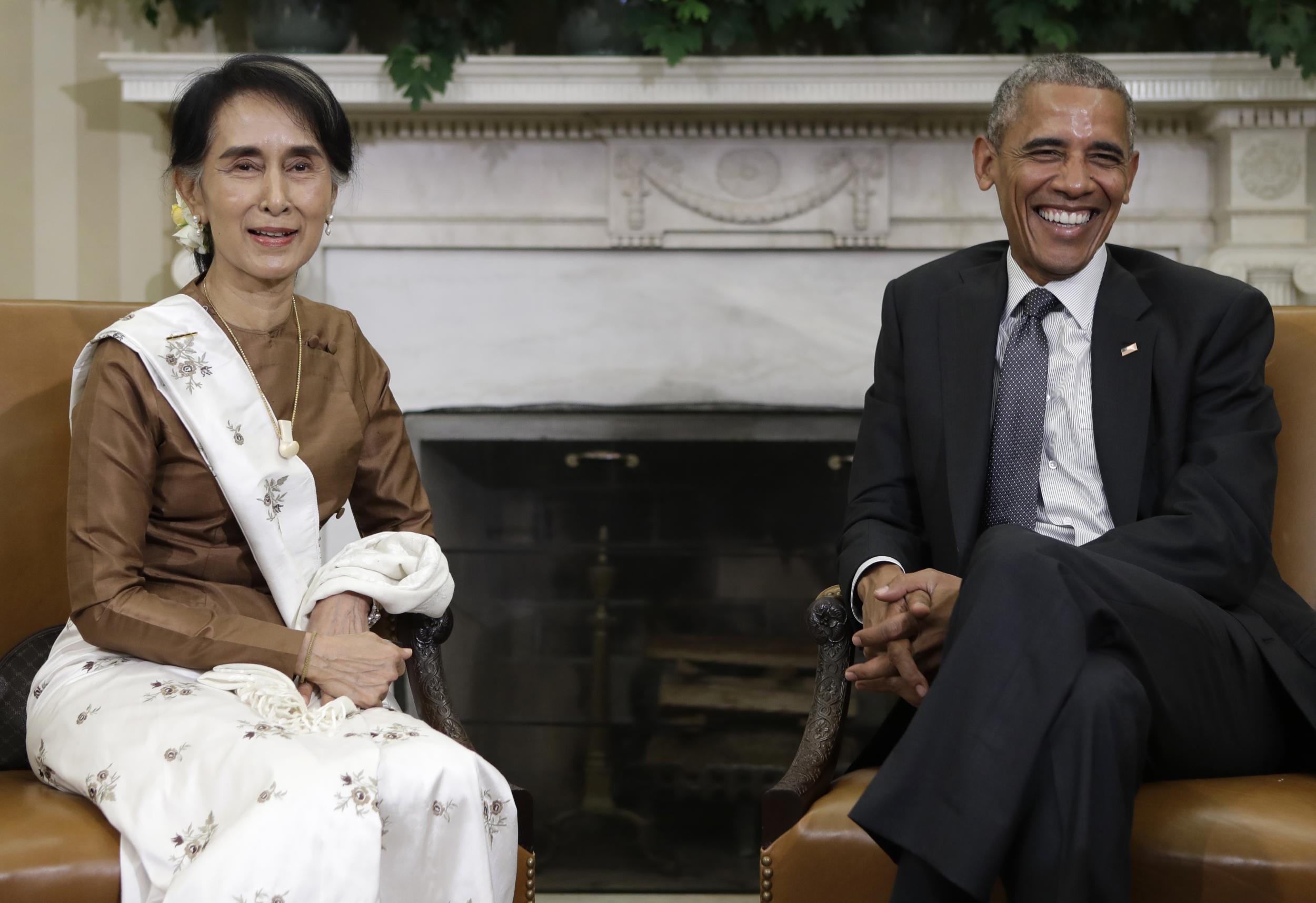Barack Obama announces plans to lift sanctions on Burma as he welcomes Aung San Suu Kyi
President hails 'remarkable' transformation as country moves towards democracy after decades under military rule

Your support helps us to tell the story
From reproductive rights to climate change to Big Tech, The Independent is on the ground when the story is developing. Whether it's investigating the financials of Elon Musk's pro-Trump PAC or producing our latest documentary, 'The A Word', which shines a light on the American women fighting for reproductive rights, we know how important it is to parse out the facts from the messaging.
At such a critical moment in US history, we need reporters on the ground. Your donation allows us to keep sending journalists to speak to both sides of the story.
The Independent is trusted by Americans across the entire political spectrum. And unlike many other quality news outlets, we choose not to lock Americans out of our reporting and analysis with paywalls. We believe quality journalism should be available to everyone, paid for by those who can afford it.
Your support makes all the difference.President Barack Obama announced the US was lifting economic sanctions and restoring trade benefits to former pariah state Burma as he met Aung San Suu Kyi, a former political prisoner who is now the nation's de facto leader.
Mr Obama hailed a “remarkable” transformation in the country also known as Myanmar, which spent five decades under oppressive military rule. Ms Suu Kyi's party swept historic elections last November, and the visit by the 71-year-old Nobel Peace Prize laureate, deeply respected in Washington, is a crowning occasion in the Obama administration's support for Myanmar's shift to democracy, which the administration views as a major foreign policy achievement.
The US has eased broad economic sanctions since political reforms began five years ago but has retained more targeted restrictions on military-owned companies and dozens of officials and associates of the former ruling junta. US companies and banks have remained leery of involvement in one of Asia's last untapped markets.
“The United States is now prepared to lift sanctions that we have imposed on Burma for quite some time,” Mr Obama said as he sat alongside Ms Suu Kyi in the Oval Office. He said it was “the right thing to do” to ensure the country benefits from its transition. Asked by a reporter when sanctions would be lifted, he added “soon.”
Ms Suu Kyi concurred it was time to remove all the sanctions that she said had hurt the country economically as it was now in a position to open up to investment. She said she wants Americans to come to the country and “to make profits.”
Congressional aides said that Suu Kyi requested the removal of the national emergency with respect to Myanmar — the executive order authorising sanctions that has been renewed annually by American presidents for two decades. She did so at a breakfast meeting earlier Wednesday with Vice President Joe Biden and congressional leaders.
An American official said that by terminating the emergency, 111 Myanmar individuals and companies will be dropped from a Treasury blacklist and restrictions will be lifted on new investment with the military and on the imports of rubies and jade.
The official and aides spoke on condition of anonymity as they were not authorised to discuss the matter publicly.
The change in policy will not remove all economic sanctions. Penalties intended to block the drug trade and to bar military trade with North Korea would still apply, as would a visa ban barring some former and current members of the military from traveling to the US.
Nor does the move does not normalise relations with Myanmar's military. The US does not intend to provide weapons, military equipment or other support for the military, the official said.
Human rights groups say there are powerful reasons for retaining sanctions. Military abuses continue in ethnic minority regions. Rohingya Muslims remain displaced by sectarian violence and denied citizenship.
Ms Suu Kyi said that Myanmar had reached a point that it had not expected to reach, but acknowledged, “There's so much that has to be done in our country.”
She said top priority was national reconciliation. She also addressed the situation in western Rakhine state, where more than 100,000 Rohingyas remain stuck in camps, separated from Buddhists, who are the majority in Myanmar. She said everyone entitled to citizenship in Myanmar should get it.
“We are sincere in trying to bring together the different communities,” she said.
Join our commenting forum
Join thought-provoking conversations, follow other Independent readers and see their replies
Comments